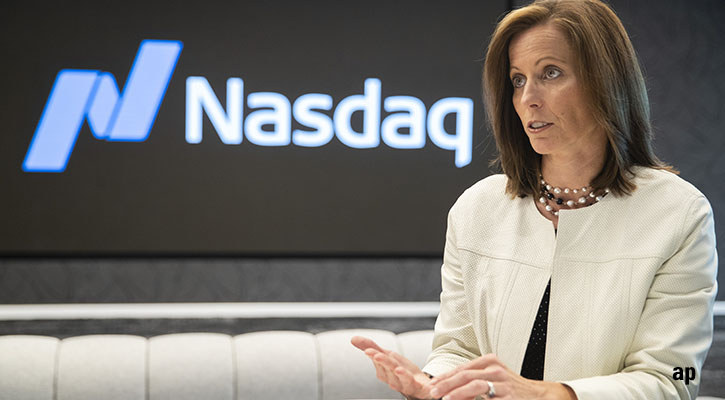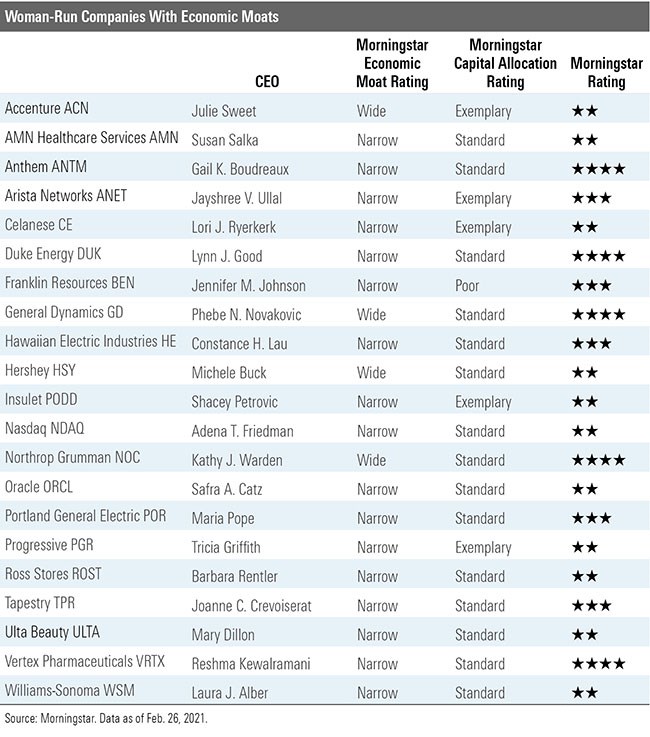
ARK Invest chief executive Cathie Wood has become a financial media favourite this yea: her ARK family of funds is raking in oodles of money, in some instances to the tune of $1 billion per day. Similarly, Bumble (BMBL) founder Whitney Wolfe Heard made headlines this year as the youngest female CEO to take a company public in the United States.
Don't let these headline makers fool you, though: women still hold a disproportionately small number of CEO roles among US companies. How small? Only 6% of CEO positions were held by females in 2019, according to recent research.
Of course, buying a stock simply because the company's CEO is a woman doesn't make any more investment sense than buying a stock simply because the company's CEO is a man. Instead, you want to examine fundamentals, consider valuation, and apply whatever other investment metrics matter to you before buying. Moreover, CEOs come and go. That female-led company may be managed by a man – and vice versa – soon enough.
With International Women’s Day this week, we're looking at woman-led companies through the lens of economic moats: We're sharing some companies that our analysts follow with Morningstar Economic Moat Ratings of wide and narrow that have women at the helm. These firms have all carved out competitive advantages that should allow them to thrive for the next decade or more.

Here's a closer look at three of the stocks from the list:
Nasdaq (NDAQ)
Michael Wong
"Nasdaq is adeptly making the transition from being solely an equity exchange to a diversified data and technology company. Although Nasdaq's market services, or traditional trading, business accounts for less than 40% of net revenue, the firm is benefiting from higher transaction-based revenue. The market services business received a nice bump in revenue in 2020 from higher market volatility and changes in retail investor behaviour because of COVID-19, which we expect will partially revert in the following quarters. The market services business remains a key part of Nasdaq's overall business, as it is the foundation for much of the company's other segments: information services, market technology, and corporate services.
"We believe that the company's pivot in recent years under CEO Adena Friedman has been beneficial. The cash equities and equity options that are the bulk of Nasdaq's market services business are competitive, and new competitors have emerged in recent years. There's also been some pushback from clients and regulators regarding the pricing of data products. The movement into areas with large addressable markets, such as financial compliance services, and those that are exposed to secular tailwinds, such as indexes and ESG, could provide a fairly exciting revenue growth story for the company."
Anthem (ANTM)
Julie Utterback
"Anthem continues to capitalise on its enviable position as the exclusive licensee of the Blue Cross Blue Shield brand in 14 states. We would argue that the Blue Cross Blue Shield brand is the most recognizable and trusted franchise in the US health insurance industry. As the largest Blue Cross Blue Shield operator, Anthem (42.9 million at the end of 2020) nearly covers as many medical members as industry leader UnitedHealth (UNH) (43.0 million). Anthem's position is particularly impressive given its limited geographic reach compared with UnitedHealth's national network. Specifically, Anthem's market share dives deep in its license states where it claims average membership share of around 35%. This high local market share remains particularly valuable in health insurance since medical care providers typically only operate in limited geographic areas, making local market share the most relevant to most reimbursement negotiations.
"With its substantial local and national market share, Anthem aims to deepen its influence on both the provider and client front. On the provider front, Anthem uses its deep local market share to align incentives through value-based and risk-sharing relationships that appear significantly above the industry average. We believe alignment like this between payers and providers could help rein in healthcare cost trends in the U.S., which should benefit clients and end users alike. On the client front, Anthem's launch of its IngenioRx pharmacy benefit management platform should help it provide a more holistic view of a patient's health, which could lead to better cost controls and management of health conditions. Anthem aims to roll out this service to existing clients and expand its reach with other Blue Cross Blue Shield systems in particular.”
Duke Energy (DUK)
Andrew Bischof
"Duke Energy is one of the largest regulated utilities by market cap in the United States. Florida is Duke's most constructive and attractive jurisdiction, with higher-than-average load growth and best-in-class regulation that allows for higher-than-average returns on equity, forward-looking rates, and automatic base-rate adjustments. We expect significant solar growth in the region, and new legislation offers a long runway of storm-hardening investments.
"Duke's updated $60 billion, five-year capital investment plan is focused on clean energy as the company works toward net-zero carbon emissions by 2050 and net-zero methane emissions by 2030. Management recently gave us a first look into growth opportunities beyond 2024, noting expectations for $65 billion to $75 billion of capital expenditures, supporting 7% annual rate base growth from 2024-29."
























